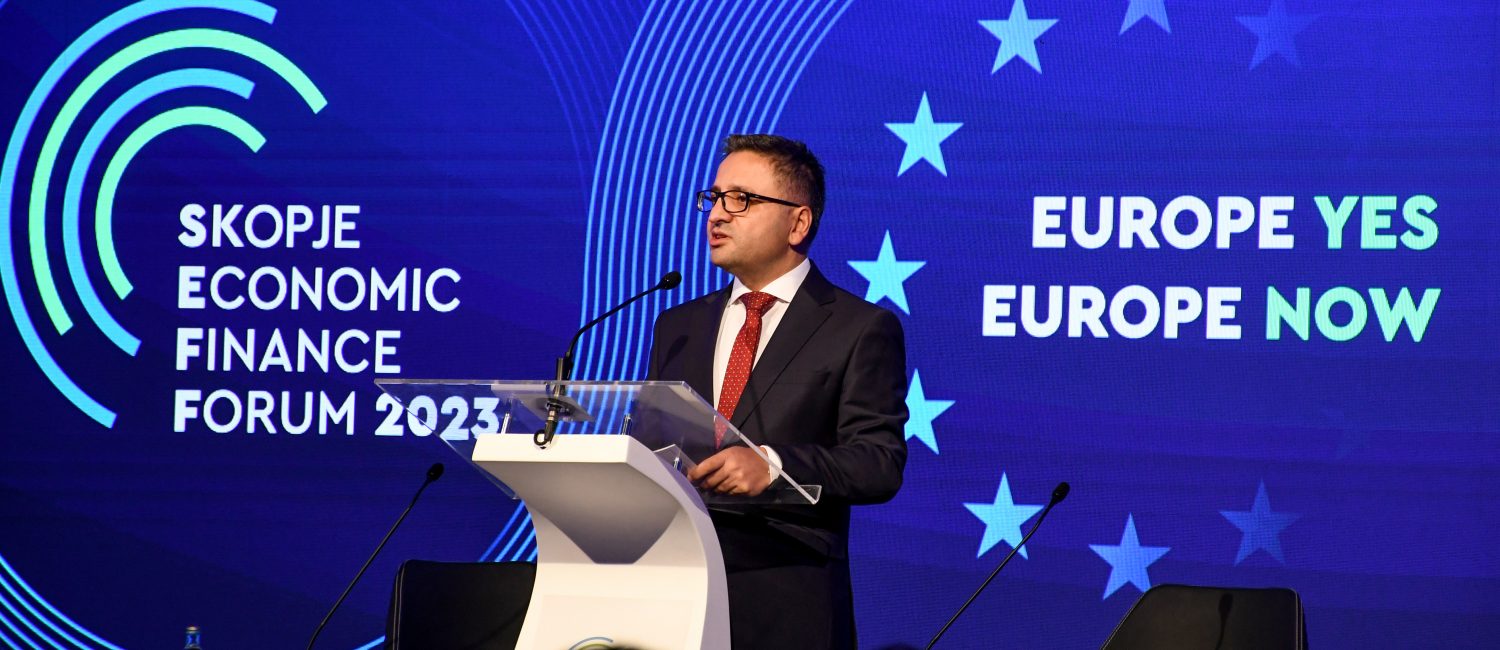23th September 2023, Skopje – European Union is not a destination but rather a journey. Democratic society, observance and protection of rights and rule of law, multi-ethnicity, multiculturalism, freedom of movement of goods, capital and people, peace and security, development and prosperity are the common values that unite 450 million of citizens in 27 countries in a single and pacifistic union, single market and economic superpower. I have written a lot about the EU, from the perspective of benefits, investments, trade growth, accelerated economic growth, job creation, higher living standard of the citizens, etc. However, EU membership is not a trophy at the end of the race, or as the EU Commissioner, Johannes Hahn, pointed out at the Skopje Economic and Financial Forum – SEFF, “The EU is not a cash machine, an ATM, joining the Union is also joining common values”. “Bringing Europe home before joining the EU” is the axiom arising therefrom, which remarkably captures the essence of the EU integration process – to take actions, while being guided by true values and goals, all to the end of creating a better future. Membership in the European Union is not our destination, but rather an approach to a “common journey” towards a better future, prosperity and a higher living standard.
The Path to the EU is the Only Way Forward. Although the sentiment about joining the EU has varied throughout the years, the destination we are aiming for, has remained the same over the past thirty years. Therefore, the topic of discussion at this year’s SEFF Conference was not formulated as a question – “Whether Europe” and “When Europe”, but it rather gained a declarative form “Europe YES, Europe – NOW”. Discussions were geared towards accelerating the EU integration process, i.e. improving the economic performance, the social conditions, providing efficient legal system, and promoting the regional cooperation and connectivity and ties.
SEFF emerged as a response to COVID-19 crisis, thus rising above the need for discussion and coordination of the policies at regional level among all stakeholders. The 3-year period that followed, i.e. several overlapping crises was not a challenge that policy makers, companies and citizens could neglect. Commitment to transparent, broad discussion and a holistic approach in the creation of new ideas and instructions about acting thereupon, has become a necessity, with SEFF growing into a regional brand implying connectivity and ties and unification of diverse profiles of social actors when sharing the best ideas and practices for taking further steps and policies.
Let me get back to the topic of this column, – the road to EU, a path, which will provide us with better living conditions, while also ensuring a better tomorrow for our children.
Development Synergy via European Integration and Regional Connectivity and Ties
Connectivity and Ties were the first point of discussion at this year’s SEFF. The very concept of the EU, as well as SEFF, is synergy, i.e. improved economic performance via connection. Although, the reader is already familiar with the commitment to connecting the Western Balkan countries for the purpose of enjoying the benefits of the four EU freedoms by the region, I will try to hereby further explain, as vividly as possible, the reason why this is crucial on our road to the EU, i.e. in building a better life for our citizens. Economic Benefits. As per the World Bank assessments, intra-regional trade in the Western Balkans is estimated at around 20% of the total trade in 2019, thus highlighting the room for regional trade growth. Simplifying the cross-border procedures leads to lowering the trade-related costs. World Bank estimated that the costs for cross-border trade in the Western Balkans are relative high, whereby approximately 17 hours are needed for export. As the World Bank Country Director for the Western Balkans pointed out, by cutting the time period by 3 hours, the customs tariff rates are reduced by 2 percentage points. Furthermore, more integrated regional market may attract more foreign investments, as evident from the example with Europe; larger market actually attracts more investors.
Infrastructure Development. Regional connectivity and ties are the blood stream of the infrastructure development. Efficient transport connections, energy and digital networks across the region provide for smooth flow of goods, services and ideas. The regional corridors exactly provide for adding value to the national economies via investments, trade, transport, tourism and strengthened geostrategic positions of the countries.
Free Movement of People. Facilitating the travel of citizens in the region contributes to encouraging tourism and travel in general. Prior to the pandemic, World Tourism Organization (UNWTO) recorded 18 million tourist arrivals in the Western Balkan countries. Facilitating the free movement provides for increased number of tourist arrivals. Moreover, the procedures related to study visits and the opportunity to exchange experience, trainings and education in the region, are also simplified.
Increased Resilience of the Economies to External Shocks. Regional connectivity and ties, infrastructure development, diversification of trade partners and nearshoring may contribute to strengthening the resilience of certain economies against further potential global shocks, all this being coupled by the energy safety.
Regional Stability. Regional cooperation is particularly significant in maintaining the regional stability, taking into account that the higher level of cooperation reduces the conflicts, all to the end of protecting the economic activities. In addition, the regional cooperation is encouraged by the EU, given that the connectivity and the ties are specifically the primary goal of the EU. The first two of the four pillars of the new EU plan on growth of the Western Balkans, pertain to the regional and the EU connectivity and ties. As the European Commission President announced, the Western Balkan countries will be given the possibility to reap, much earlier, the benefits from the main driver of the EU economic growth – the Single Market, most probably through a broader segment thereof, as the means of trade in goods and services via digital channels.
Politicians should always put things in perspective. Thus, the benefits of connecting people, companies and economies in the region, should be at the top of the agenda.
Structural Reforms for Accelerating the Convergence towards the EU
Next process, which will contribute to strengthening the Western Balkan economies, as well as accelerating the convergence towards the EU, covers the implementation of structural reforms in support of boosted economic growth, greater competitiveness, opening up new businesses and job creation. Rule of Law, Corruption Prevention and Rule of Law are part of these reforms, by implementing the measures focused on combatting corruption, judiciary reforms and public administration.
Human capital reforms equally play the pivotal role therein. As per the latest data on the Human Capital Index, calculated by the World Bank, the average in 2021 for the Western Balkan countries is 0.57 (the index ranges from 0 to 1). This means that children who are born now will only exploit 57% of their potential when they reach adulthood, as result of the education, the health the social care system their country provides. Although Republic of North Macedonia has the highest HCI in the region (0.59), there is still much room for improvements, considering that the value of this Index in the development economies ranges above 0.7. Our Government strives, by allocating substantial budget funds, as well as by implementing qualitative reforms, to contribute to continuous improvement of this Index. In addition to the human capital investments, matching of the skills produced by the workforce with the labor market needs, is also of crucial importance. Investing in the educational process, the trainings for workers meeting the market needs, while also implementing reforms that will balance between job security and market flexibility, will provide for significant support for the economy and the business adaptation to changes. Introduction of continuous learning also contributes to improving the quality and relevance of education. Support of science and research, by encouraging the synergy between the science and the private sector, plays a part in strengthening the innovation and the entrepreneurship in the private sector.
I mentioned the significance of infrastructure development above, however, touching upon the structural reforms is also inevitable. Development of transport and energy infrastructure will boost the investment process, improve connectivity and ties and trade, and thus stimulate economic development.
Competitive private sector is of vital significance for the economic growth. Investments and entrepreneurship are stimulated through continuous easing of regulations for doing a business, their simplification and reduction of bureaucracy. Undertaking activities aimed at increasing access to finance for small- and medium-sized enterprises, via development of financial markets and support mechanisms, is extremely significant.
Environment Sustainability becomes increasingly important for long-term and sustainable development. Structural reforms should be focused on strengthening the environmental regulations and the sustainability in the field of energy, agriculture and production. Furthermore, it is necessary to scale up the investments in renewable energy sources, all to the end of reducing the carbon dioxide emissions and increasing the energy safety.
Geopolitical Background: Best timing for the Western Balkans
Geopolitical setting, as part of the development processes of the region, was also discussed at SEFF Current geopolitical background brings both challenges and possibilities for the Western Balkan countries. Outbreak of the armed conflict in Ukraine implied high inflation and increased trade deficit for the open and the energy-dependent Western Balkan economies, whereby, on the other hand, the need to continue the European integration process with Western Balkans as an integral part thereof, became the obvious path. Best timing for EU enlargement has been highlighted in the analyses of all renowned agencies, thin-thanks, as well as by EU officials. New European Commission plan on growth of Western Balkans is also aimed thereon. Need to consolidate Europe with the Western Balkans as an integral part thereof, is evident. Hence, the development processes, as well as the political process should wisely take advantage of the geopolitical background, since it is uncertain whether such an opportunity will rise again.
The Business, the EU and the Global Trends
SEFF is a broad platform for discussion, and accordingly, the business sector is an important participant in the discussions and shaping of ideas and future policies. Hence, the representatives of the business community, i.e. the chambers of commerce shared their views on the global trends and the possibilities they offer as regards the doing of business at SEFF. General impression is that all representatives of the business sector, without exception, recognize the European path as the road to progress. Boosted competitiveness by exploiting the benefits of digitalization, investing in sustainable, renewable energy sources, investing in human capital are opportunities that have been mapped by the business community to accelerate the economic development. Informal economy being at high level in Western Balkan countries, as well as the migrations and the needs on the labor market, are the challenges we should still overcome.
All these discussions are relevant in view of mapping the needs for development of our economies, convergence towards the developed EU economies and “Bringing Europe home”. I would like to hereby express my utmost gratitude to all present here, enriching the discussions at this year’s conference with their presence, as well as the team organizing this event, about their exceptional dedication and professionalism, as well as our partners, “AmCham”, the support of the representatives from the entire political spectrum (Government in power and the opposition), the business community, the academic and civil community, as well as the representatives from the international institutions and the development partners. SEFF has been held for the third time in a row and I will hereby reiterate the statement I made thereat: “Once is an event, twice is a repetition and three times is a tradition”. I am confident that these open discussions oriented towards the economy, along with the vision for growth will further remain to be a good traditional practice in future.
















